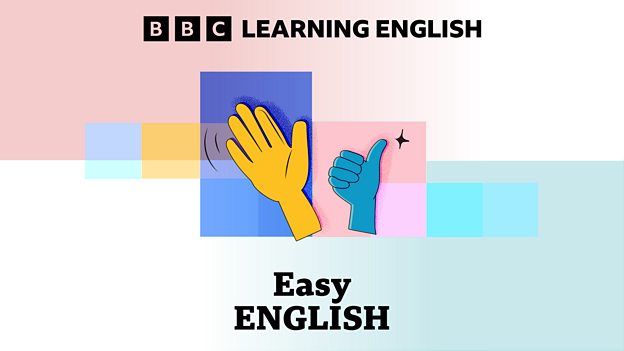6 Minute English
Intermediate level
Are you drinking enough water?
Episode 250102 / 02 Jan 2025

_____________________________________________________________________________________________________
Download a free 6 Minute English worksheet!
Download a free transcript!
______________________________________________________________________________________________________
Try more episodes of 6 Minute English:
- Embarrassed to go to the doctor?
- Call centres: Are you talking to AI?
- Can you trust ancestry DNA tests?
______________________________________________________________________________________________________
Introduction
How much water do you drink every day? Is it enough? Beth and Phil discuss this and teach you some new vocabulary.
This week's question
What percentage of our blood is water? Is it:
a) around 80% water?
b) around 90% water?, or,
c) 100% water?
Listen to the programme to hear the answer.
Vocabulary
arrive at (a number or statistic)
calculate; decide on it after doing calculations
take grip on
take control of
pretty much
almost; almost completely
ballpark figure
a number which is a guess but an acceptably accurate approximation
dehydration
condition of not having enough water in your body so that you feel ill or weak
symptom
sign or feeling in the body showing the presence of an illness or a condition
TRANSCRIPT
Note: This is not a word-for-word transcript.
Phil
Hello. This is 6 Minute English from BBC Learning English. I'm Phil.
Beth
And I'm Beth. Nowadays, I often see people carrying water bottles with them to make sure they drink enough. How much water do you drink a day, Phil?
Phil
Oh, I don't know. Maybe about a litre?
Beth
OK. And do you know how much water you should drink a day?
Phil
I think it's probably about two litres.
Beth
Ah, well, the number many people have heard is two litres a day. Of course, everyone needs to drink some water - over half the human body is made up of it. But exactly how much water do we need to stay healthy? That's what we'll be discussing in this programme, along with some useful new vocabulary as well.
Phil
And speaking of vocabulary, remember you can download all the new words and phrases from this programme, plus worksheet exercises to help you learn them, on our website, bbclearningenglish.com.
Beth
Great! But first I have a question for you, Phil. I mentioned that over half the human body consists of water, but there's an even higher percentage of water in our blood. But how much? Is our blood:
a) around 80% water?
b) around 90% water? or,
c) 100% water?
Phil
I think it's around 80% water.
Beth
OK, I will reveal the correct answer later in the programme. Our blood needs water so it can carry nutrients to the body's cells and organs. The amount recommended is often given as two litres a day. But why? Here to discuss this with BBC World Service programme, The Food Chain, is biologist, Professor John Speakman:
Professor John Speakman
So, I'm not sure how it was arrived at but it seems to be a number that has taken grip on a very large number of countries. So, if you look at government recommendations around the world, they're pretty much all the same. They pretty much all say everybody's got to be drinking two litres of water.
Phil
Professor Speakman doesn't know how the number of two litres a day was arrived at – how it was decided or calculated. Nevertheless, the idea of drinking two litres a day has taken grip on many governments around the world. When you say an idea has taken grip on something, you mean it's taken control of it.
Beth
Yes, Professor Speakman says that pretty much all governments are giving pretty much the same recommendation. He uses the phrase, pretty much to mean almost. For example, 'pretty much all governments advise drinking two litres a day' means 'almost all governments advise it'.
Phil
What Professor Speakman doesn't have, however, is any scientific evidence for this advice. The number of exactly two litres isn't based on scientific fact, it's more of a ballpark figure – a number which is a guess, but which you still believe is approximately correct.
Beth
Actually, the amount of water in our bodies is changing all the time. Like your bank balance, which goes down when you spend money, your body loses water all the time, when you breathe, sweat, or go to the toilet. Exactly how much you need to drink depends on how much water your body needs to replace, and that mainly depends on your size.
Phil
But what happens when we drink less than we should? Here's hydration expert, Dr Nidia Rodriguez-Sanchez, describing the effects of dehydration to BBC World Service's The Food Chain.
Dr Nidia Rodriguez-Sanchez
And also, many times we start getting dehydrated and we don't realise we are dehydrated. So it's very common that we feel tired, or we feel, like, with a bit of a headache, or even we think we're hungry, and we go and get some food. And actually what is happening is that we are thirsty, that we are dehydrated, we are starting to show some signs or some symptoms of dehydration.
Phil
Dr Sanchez describes the effects of dehydration, the condition of not having enough water in your body so that you feel ill or weak. She mentions feeling tired, having a headache or a dry mouth as symptoms of dehydration. Symptoms are signs or feelings in the body showing the presence of some illness or condition.
Beth
So, whether you drink a little more, or a little less, it seems that around two litres of water a day is a good way to keep your blood and body healthy. Speaking of which, Phil, it's time to reveal the answer to my question, what percentage of our blood is water? You said 80%, and the answer is 90%. Our blood consists of around 90% water.
OK, let's recap the vocabulary we've used, starting with the phrase to arrive at a number, meaning to decide it by doing calculations.
Phil
If an idea takes grip on something, it takes control of it.
Beth
The phrase pretty much means almost; for example, pretty much everyone likes chocolate, which means almost everyone likes chocolate.
Phil
A ballpark figure is a phrase meaning a number which is an acceptably accurate approximation.
Beth
Dehydration is the condition of not having enough water in your body so that you feel ill or weak.
Phil
And finally, a symptom is a sign or feeling in the body showing the presence of an illness or condition. Once again, our six minutes are up. Why not join me now and head over to our website, bbclearningenglish.com, download the worksheet for this programme, and test yourself to see how much you remember? See you there soon!
Beth
Bye!
Latest 6 Minute English

How can we help wild bees?
Episode 250717 / 17 Jul 2025
Did you know that many species of wild bees are endangered in the UK? What can we do to help?

Do you need to declutter your home?
Episode 250710 / 10 Jul 2025
Is your home neat and tidy? Or is it full of stuff you no longer need? You might need to declutter!

How do you say sorry?
Episode 250703 / 03 Jul 2025
Different cultures apologise in different ways. How do people say sorry where you are from?

Are plant-based substitutes healthier than meat?
Episode 250626 / 26 Jun 2025
Processed meat has been shown to be bad for our health, but are plant-based meat substitutes any healthier?

How do babies communicate?
Episode 250619 / 19 Jun 2025
What does it mean when newborn babies wave their arms and legs about?

Can climate change affect our mental health?
Episode 250612 / 12 Jun 2025
Is your mental health being affected by climate change?

How important is politeness?
Episode 250605 / 05 Jun 2025
How would you greet somebody you didn't know?

What's your favourite kind of noodle?
Episode 250529 / 29 May 2025
How much do you know about noodles?


Which cooking oil is the best?
Episode 250515 / 15 May 2025
Are some cooking oils better for your health than others?

Should animals be kept in zoos?
Episode 250508 / 08 May 2025
Are zoos an important scientific resource, or an unnecessary abuse of animal rights?

Can cows prevent wildfires?
Episode 250501 / 01 May 2025
How are cows helping to prevent wildfires in Spain?

How climate change affects animal migration
Episode 250424 / 24 Apr 2025
How is climate change affecting animal migration?

Can AI solve crime?
Episode 250417 / 17 Apr 2025
Could artificial intelligence be used to solve a murder?


Are we getting more allergic to things?
Episode 250403 / 03 Apr 2025
Do you know anyone who has 50+ allergies?

Can we boost the immune system?
Episode 250327 / 27 Mar 2025
Can ginger shots, turmeric and cold water swimming boost your immune system?


Should we eat less rice?
Episode 250313 / 13 Mar 2025
Is it possible to grow rice in a more eco-friendly way?



Young women on social media
Episode 250220 / 20 Feb 2025
How do women in different countries experience the online world?

Rage bait: How online anger makes money
Episode 250213 / 13 Feb 2025
How do people make money from rage bait?



How the world learned to love fast food
Episode 250123 / 23 Jan 2025
How did fast food spread around the world?

Which country has the best schools?
Episode 250116 / 16 Jan 2025
How do you compare education systems?

Eating 50-year-old stew
Episode 250109 / 09 Jan 2025
Would you eat a stew that's been in a pot for 50 years?

Are you drinking enough water?
Episode 250102 / 02 Jan 2025
How much water do you drink every day? Is it enough?







